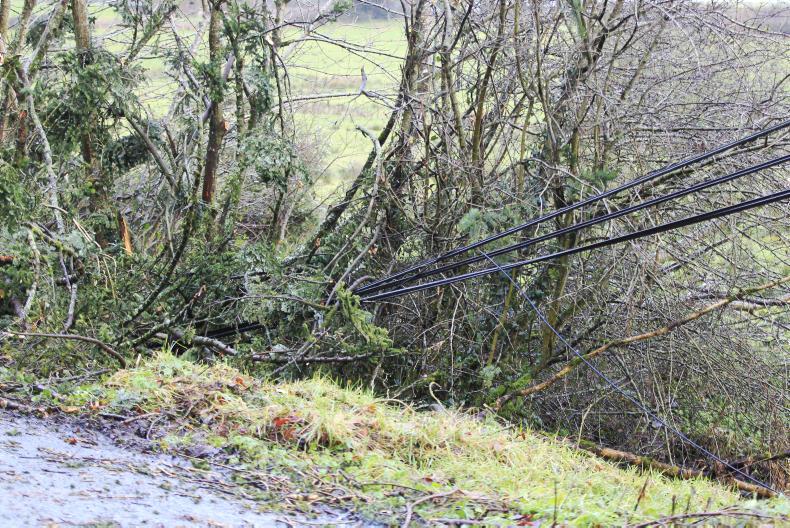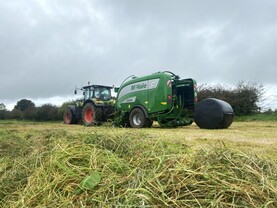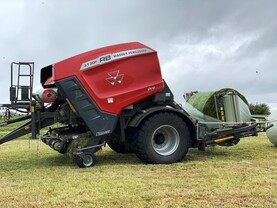Farming is considered one of the most dangerous occupations in Ireland. Contracting by its nature follows the same type of work so it too deserves the unfortunate title. In this page, we give a few pointers for contractors for this time of year and the year ahead to make them and the people around them safer.
Whether it’s slurry spreading, operating a front end loader to tidy up fallen trees and limbs after the recent storms or any work at height, contractors and farmers need to pay attention to overhead wires. These may have become damaged and be close to the ground unbeknownst to the landowner or contractor carrying on the work. Before you start the job of tidying up along ditches, check where you are about to work. If in doubt, contact the ESB on 1850-372 999.
2 Tractor and trailer brakes
In the past few weeks there have been a lot of silage bales on the move, sometimes travelling long distances having been bought from another farmer. Care needs to be taken with the weight of loads on trailers as silage bales can vary greatly depending on the moisture at the time of baling. All bales now have to be secured during transport. Also, take time to inspect the amount of material left on the brake pads of your trailer. If in doubt, ask a trained technician to inspect them and if required replace them. Remember, having properly working trailer brakes will save the brakes in your tractor, potentially saving hundreds of euros in repairs.
3 Tractor mirrors and rotating beacon
As simple as it sounds, these need to be in place and working for travelling on a public road. Mirrors make your life and that of other motorists safer as you can pull in to let traffic pass at a safe point on the road. Rotating beacons alert other road users so they can reduce their speed.
Unfortunately, punctures happen and they never happen at a good time. This doesn’t mean less care should be taken when it comes to repairing them. Trained and qualified professionals should be used to repair tyres where damage has been done. Quite often the tyre can be fully repaired and continue being used when the repair has been done correctly.
If in doubt about a tyre, contact your local supplier to have a look at it. This not only prolongs the life of the tyre but also makes it safer to use. If inflating a tyre, a cage should be used to prevent a blowout. These save lives and prevent serious injury. This in combination with a long inflation hose make tyre inflation safer and reduces the risk to the person inflating the tyre.
5 Slurry agitation and spreading
Despite the time of year, there is still a lot of slurry to be spread across the country. Remember that slurry gas is released when slurry is agitated and it kills. Agitate underground tanks when there is a good breeze to reduce the risk of gas build-up. Once the agitator is in operation, evacuate the building of all cattle, people and pets as they are all liable to harm from this lethal gas. Gas detectors are an aid but err on the side of caution.
Whether it’s slurry spreading, beet harvesting or any other field work, some mud will end up on the road. Alert fellow motorists of the risk by placing warning signs in a visible place on the road and where possible clean the road with a bucket-brush.
Are you up to the challenge?
As part of our Safe Family Farms initiative, we are delighted to be involved with ESB Networks National Safety Challenge.
How can you innovate safety in the agricultural sector and how would you implement this innovation?
The competition is open to all senior cycle students, including TYs. Entries and ideas will be accepted in any format: written (up to 300 words), visual (eg photography, poster, design, sketch) or digital (eg audio, video) and students/groups are invited to submit any concepts, initiatives, plans or ideas they feel will push the boundaries of innovation and pave the way for a safer working environment across the industry.
Four national finalists will win €200 in vouchers and a workshop for their class, with one national winner receiving a total prize of €1,000 in vouchers. National finalists will also have their ideas featured in the Irish Farmers Journal, print and online.
Closing date for entries is 23 March 2018.
For more information and terms and conditions, visit www.esbnetworks.ie/education or email safefamilyfarms@farmersjournal.ie. Email your entries or post them to ESB Networks National Safety Challenge, C/O Irish Farmers Journal, Irish Farm Centre, Bluebell, Dublin 12.
Farming is considered one of the most dangerous occupations in Ireland. Contracting by its nature follows the same type of work so it too deserves the unfortunate title. In this page, we give a few pointers for contractors for this time of year and the year ahead to make them and the people around them safer.
Whether it’s slurry spreading, operating a front end loader to tidy up fallen trees and limbs after the recent storms or any work at height, contractors and farmers need to pay attention to overhead wires. These may have become damaged and be close to the ground unbeknownst to the landowner or contractor carrying on the work. Before you start the job of tidying up along ditches, check where you are about to work. If in doubt, contact the ESB on 1850-372 999.
2 Tractor and trailer brakes
In the past few weeks there have been a lot of silage bales on the move, sometimes travelling long distances having been bought from another farmer. Care needs to be taken with the weight of loads on trailers as silage bales can vary greatly depending on the moisture at the time of baling. All bales now have to be secured during transport. Also, take time to inspect the amount of material left on the brake pads of your trailer. If in doubt, ask a trained technician to inspect them and if required replace them. Remember, having properly working trailer brakes will save the brakes in your tractor, potentially saving hundreds of euros in repairs.
3 Tractor mirrors and rotating beacon
As simple as it sounds, these need to be in place and working for travelling on a public road. Mirrors make your life and that of other motorists safer as you can pull in to let traffic pass at a safe point on the road. Rotating beacons alert other road users so they can reduce their speed.
Unfortunately, punctures happen and they never happen at a good time. This doesn’t mean less care should be taken when it comes to repairing them. Trained and qualified professionals should be used to repair tyres where damage has been done. Quite often the tyre can be fully repaired and continue being used when the repair has been done correctly.
If in doubt about a tyre, contact your local supplier to have a look at it. This not only prolongs the life of the tyre but also makes it safer to use. If inflating a tyre, a cage should be used to prevent a blowout. These save lives and prevent serious injury. This in combination with a long inflation hose make tyre inflation safer and reduces the risk to the person inflating the tyre.
5 Slurry agitation and spreading
Despite the time of year, there is still a lot of slurry to be spread across the country. Remember that slurry gas is released when slurry is agitated and it kills. Agitate underground tanks when there is a good breeze to reduce the risk of gas build-up. Once the agitator is in operation, evacuate the building of all cattle, people and pets as they are all liable to harm from this lethal gas. Gas detectors are an aid but err on the side of caution.
Whether it’s slurry spreading, beet harvesting or any other field work, some mud will end up on the road. Alert fellow motorists of the risk by placing warning signs in a visible place on the road and where possible clean the road with a bucket-brush.
Are you up to the challenge?
As part of our Safe Family Farms initiative, we are delighted to be involved with ESB Networks National Safety Challenge.
How can you innovate safety in the agricultural sector and how would you implement this innovation?
The competition is open to all senior cycle students, including TYs. Entries and ideas will be accepted in any format: written (up to 300 words), visual (eg photography, poster, design, sketch) or digital (eg audio, video) and students/groups are invited to submit any concepts, initiatives, plans or ideas they feel will push the boundaries of innovation and pave the way for a safer working environment across the industry.
Four national finalists will win €200 in vouchers and a workshop for their class, with one national winner receiving a total prize of €1,000 in vouchers. National finalists will also have their ideas featured in the Irish Farmers Journal, print and online.
Closing date for entries is 23 March 2018.
For more information and terms and conditions, visit www.esbnetworks.ie/education or email safefamilyfarms@farmersjournal.ie. Email your entries or post them to ESB Networks National Safety Challenge, C/O Irish Farmers Journal, Irish Farm Centre, Bluebell, Dublin 12.






 This is a subscriber-only article
This is a subscriber-only article









SHARING OPTIONS: